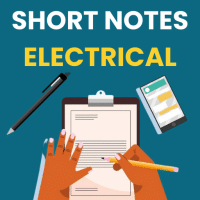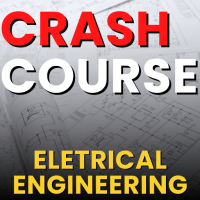Electrical Engineering (EE) Exam > Electrical Engineering (EE) Questions > The analog-to-digital converters are employed...
Start Learning for Free
The analog-to-digital converters are employed in:
- a)Voltmeter
- b)Wattmeter
- c)Energy meter
- d)Digital multimeter
Correct answer is option 'D'. Can you explain this answer?
Verified Answer
The analog-to-digital converters are employed in:a)Voltmeterb)Wattmete...
Digital multimeter necessarily employs an analog-to-digital converter (ADC).
- Voltmeter: While some digital voltmeters use ADCs, there are also analog voltmeters that use a moving needle mechanism to display voltage.
- Wattmeter: Similarly, some digital wattmeters use ADCs for measuring current and voltage, but analog wattmeters exist that rely on electromagnets to measure power.
- Energy meter: Similar to wattmeters, both digital and analog energy meters exist, with digital ones utilizing ADCs and analog ones employing rotating disks or induction coils.
- Digital multimeter: This multi-function instrument combines the functionalities of measuring voltage, current, resistance, and sometimes other electrical properties. All digital multimeters require an ADC to convert the analog electrical signals from these measurements into digital readings displayed on the screen.
Therefore, while ADCs can be found in some digital versions of the other instruments, it's a necessary component only in digital multimeters.
Additionally, digital multimeters typically employ multiple ADCs, each tailored for specific measurement ranges and types (e.g., high-resolution ADC for voltage, high-speed ADC for current). This allows for accurate and versatile measurements across various electrical parameters.
Most Upvoted Answer
The analog-to-digital converters are employed in:a)Voltmeterb)Wattmete...
Understanding Analog-to-Digital Converters (ADCs)
Analog-to-Digital Converters (ADCs) are essential components in electronic measurement systems that convert analog signals into digital data. This conversion allows for easier processing, storage, and analysis of information.
Role of ADCs in Measurement Devices
- Voltmeter: Traditional voltmeters can be analog or digital. While digital voltmeters use ADCs, analog voltmeters do not require them as they display voltage values on a scale.
- Wattmeter: Wattmeters measure electrical power but can be either analog or digital. Analog wattmeters operate without ADCs, while digital models do use them for displaying values.
- Energy Meter: Similar to wattmeters, energy meters can also be analog or digital. Analog energy meters directly measure and display energy without the need for conversion, while digital versions use ADCs.
Why Digital Multimeter (DMM) Uses ADCs
- Digital Multimeter (DMM): DMMs are versatile instruments that measure voltage, current, and resistance. They require precise conversion of analog signals to digital for accurate readings.
- Measurement Accuracy: ADCs in DMMs enable higher accuracy and reliability in measurements. The digital output can be processed, stored, and analyzed easily.
- User Interface: The digital format of measurements in DMMs allows for clear and easy interpretation of data, often with additional features like auto-ranging and data logging.
In summary, while other devices may incorporate both analog and digital types, ADCs are specifically critical for the functioning of digital multimeters, making option 'D' the correct choice.
Analog-to-Digital Converters (ADCs) are essential components in electronic measurement systems that convert analog signals into digital data. This conversion allows for easier processing, storage, and analysis of information.
Role of ADCs in Measurement Devices
- Voltmeter: Traditional voltmeters can be analog or digital. While digital voltmeters use ADCs, analog voltmeters do not require them as they display voltage values on a scale.
- Wattmeter: Wattmeters measure electrical power but can be either analog or digital. Analog wattmeters operate without ADCs, while digital models do use them for displaying values.
- Energy Meter: Similar to wattmeters, energy meters can also be analog or digital. Analog energy meters directly measure and display energy without the need for conversion, while digital versions use ADCs.
Why Digital Multimeter (DMM) Uses ADCs
- Digital Multimeter (DMM): DMMs are versatile instruments that measure voltage, current, and resistance. They require precise conversion of analog signals to digital for accurate readings.
- Measurement Accuracy: ADCs in DMMs enable higher accuracy and reliability in measurements. The digital output can be processed, stored, and analyzed easily.
- User Interface: The digital format of measurements in DMMs allows for clear and easy interpretation of data, often with additional features like auto-ranging and data logging.
In summary, while other devices may incorporate both analog and digital types, ADCs are specifically critical for the functioning of digital multimeters, making option 'D' the correct choice.

|
Explore Courses for Electrical Engineering (EE) exam
|

|
Question Description
The analog-to-digital converters are employed in:a)Voltmeterb)Wattmeterc)Energy meterd)Digital multimeterCorrect answer is option 'D'. Can you explain this answer? for Electrical Engineering (EE) 2025 is part of Electrical Engineering (EE) preparation. The Question and answers have been prepared according to the Electrical Engineering (EE) exam syllabus. Information about The analog-to-digital converters are employed in:a)Voltmeterb)Wattmeterc)Energy meterd)Digital multimeterCorrect answer is option 'D'. Can you explain this answer? covers all topics & solutions for Electrical Engineering (EE) 2025 Exam. Find important definitions, questions, meanings, examples, exercises and tests below for The analog-to-digital converters are employed in:a)Voltmeterb)Wattmeterc)Energy meterd)Digital multimeterCorrect answer is option 'D'. Can you explain this answer?.
The analog-to-digital converters are employed in:a)Voltmeterb)Wattmeterc)Energy meterd)Digital multimeterCorrect answer is option 'D'. Can you explain this answer? for Electrical Engineering (EE) 2025 is part of Electrical Engineering (EE) preparation. The Question and answers have been prepared according to the Electrical Engineering (EE) exam syllabus. Information about The analog-to-digital converters are employed in:a)Voltmeterb)Wattmeterc)Energy meterd)Digital multimeterCorrect answer is option 'D'. Can you explain this answer? covers all topics & solutions for Electrical Engineering (EE) 2025 Exam. Find important definitions, questions, meanings, examples, exercises and tests below for The analog-to-digital converters are employed in:a)Voltmeterb)Wattmeterc)Energy meterd)Digital multimeterCorrect answer is option 'D'. Can you explain this answer?.
Solutions for The analog-to-digital converters are employed in:a)Voltmeterb)Wattmeterc)Energy meterd)Digital multimeterCorrect answer is option 'D'. Can you explain this answer? in English & in Hindi are available as part of our courses for Electrical Engineering (EE).
Download more important topics, notes, lectures and mock test series for Electrical Engineering (EE) Exam by signing up for free.
Here you can find the meaning of The analog-to-digital converters are employed in:a)Voltmeterb)Wattmeterc)Energy meterd)Digital multimeterCorrect answer is option 'D'. Can you explain this answer? defined & explained in the simplest way possible. Besides giving the explanation of
The analog-to-digital converters are employed in:a)Voltmeterb)Wattmeterc)Energy meterd)Digital multimeterCorrect answer is option 'D'. Can you explain this answer?, a detailed solution for The analog-to-digital converters are employed in:a)Voltmeterb)Wattmeterc)Energy meterd)Digital multimeterCorrect answer is option 'D'. Can you explain this answer? has been provided alongside types of The analog-to-digital converters are employed in:a)Voltmeterb)Wattmeterc)Energy meterd)Digital multimeterCorrect answer is option 'D'. Can you explain this answer? theory, EduRev gives you an
ample number of questions to practice The analog-to-digital converters are employed in:a)Voltmeterb)Wattmeterc)Energy meterd)Digital multimeterCorrect answer is option 'D'. Can you explain this answer? tests, examples and also practice Electrical Engineering (EE) tests.

|
Explore Courses for Electrical Engineering (EE) exam
|

|
Signup for Free!
Signup to see your scores go up within 7 days! Learn & Practice with 1000+ FREE Notes, Videos & Tests.























